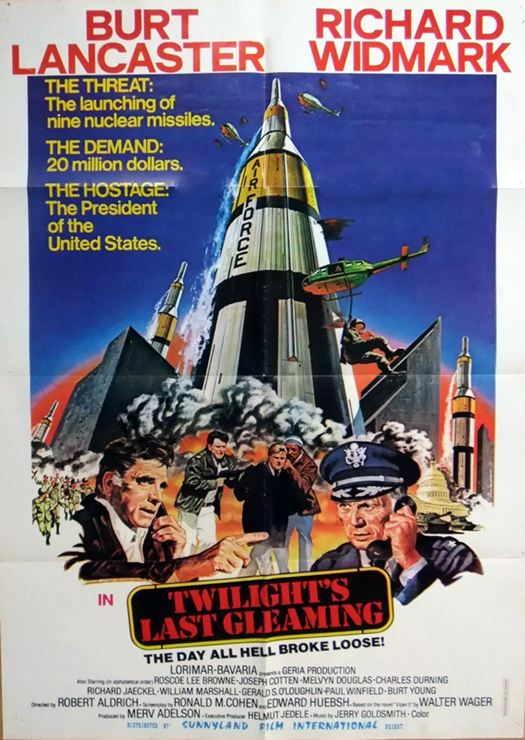I used to believe that I lived in a stable, democratic (small D) country.
I thought most people wanted the President to be intelligent, as well as ethical.
I also believed that most people realized that Liberals cared a little more about the working class than Republicans.
Today, I worry that most citizens don’t care about anything other than their pocket books.
I was a young person during the 60’s and 70’s.
It was an era of demonstrations in the streets, colleges closing down because four students were killed by the Ohio National Guard (Kent State), and a string of traumatic assassinations.
It was also a period of conspiracy films (1962’s The Manchurian Candidate, 1964’s Seven Days in May, 1973’s Executive Action, and 1977’s Twilight’s Last Gleaming).
Burt Lancaster starred in three of these films!
In the 2012 documentary Aldrich Over Munich: The Making of ‘Twilight’s Last Gleaming’ (by Robert Fischer), Fischer explains how Twilight came to be produced.
The six-million-dollar film was neither a critical, or a financial, success.
However, star Burt Lancaster, director Robert Aldrich, and the rest of the all-star cast, all hoped that it would spur discussion on the dangers of nuclear war, and the fact that the American Government lied to its’ people.
(The documentary reveals that Burt Lancaster was one of the few friends that Robert Aldrich asked to see, when Aldrich was on his deathbed.)
I just read Sex and the Constitution, by Geoffrey R. Stone.
In legal-scholar Stone’s book, I learned that it wasn’t just George Washington who feared for the future of his fledgling country.
Other Founders (like Benjamin Franklin, Thomas Jefferson, and John Adams) also feared that future citizens would simply lack the “passion for the public good” (a quote from John Adams) that’s necessary for self-government to succeed.
In Washington’s Farewell Address (1783), Washington said that only unity could prevent the nation from splintering into many parts, and from “cunning, ambitious, and unprincipled men” usurping “the very engines, which have lifted them to unjust dominion.”
I recently discovered the first volume of A Frenchman in Lincoln’s America, written on 1865 by journalist Ernest Duvergier de Hauranne (1843-1877).
Much like Alexis de Tocqueville (who visited America in 1835), this other young Frenchman visited twenty states, and discussed the American political system with many citizens.
(In short, another political young Frenchman tried to understand this “exotic” country, and reported back to France.)
One of the things that Duvergier de Hauranne noticed (fresh off the boat), was how only English visitors and immigrants were treated with any measure of civility by customs officials.
All other nationalities were treated with suspicion and hostility.
It wasn’t just a matter of American “nativism.”
In “The Invasion of Maryland” chapter, he states:
The great evil of American Democracy is . . . the apathy of the general public. . . . It is conceivable that the individual who is called upon from time to time to express an opinion on some vague, abstract question by silently casting his vote might tire of what he would come to regard as a useless formality. [Italics mine.]
At least 10 million people (who Vice President Harris, and Governor Waltz, expected to vote in the 2024 election) didn’t bother to vote, making Duvergier de Hauranne’s observations about America prescient.
The Founders believed that Democracy would only succeed if ordinary citizens learned to care about the well-being of their fellow citizens.
By July 4th, 1826, when Jefferson and Adams were on their deathbeds,* democracy looked like a very dicey bet.
John Quincy Adams (John Adam’s son) had been elected president in 1824, even though his rival (Andrew Jackson) had won 99 electoral votes, and Adams had won only 84.
The House of Representatives still ended up giving the presidency to Adams.
In 1920, Republican congressional leaders attempted to impeach Louis F. Post (1849-1928), the assistant Secretary of Labor, because Post only deported 460 people, out of the 1,600 people that J. Edgar Hoover (1895-1972) wanted him to deport.
(Read all about it in William Willrich’s book about immigrant radicals, American Anarchy.)
This book tells the story of how the U.S. government wasted millions pursuing nonviolent immigrant radicals during, and just after, WWI.
As Louis F. Post put it:
To permit aliens to violate the hospitality of this country by conspiring against it is something which no American can contemplate with patience. Equally impatient, however, must any patriotic American be with drastic proceedings on flimsy proof to deport aliens who are not conspiring against our laws and do not intend to.
Diplomat and political scientist, Madeleine Albright (1937-2022), was ambassador to the United Nations from 1993-1997, and Secretary of State from 1997-2001.
During the middle of Trump’s term, she described him as the “first anti-democratic president in modern U.S. history.”
She wrote in Fascism: A Warning (2018):
I wonder now whether we, as democratic citizens, have been remiss in forming the right questions. Maybe we have grown so accustomed to receiving immediate satisfaction from our devices that we have lost patience with democracy’s sluggish pace. Possibly, we have allowed ourselves to be manipulated by hucksters who pledge to deliver the world on a silver platter but have no clue how to make good on their promises.
Sex and the Constitution, A Frenchman in Lincoln’s America, Fascism: A Warning, and American Anarchy, have all make me realize that the seeds of America’s destruction, as a democratic nation, have been sprouting since 1776.
On November 5th, a battle was lost.
We learned what most U.S. voters actually care about.
*One of the ironies of American history, is that Thomas Jefferson and John Adams both died on the same day, July 4, 1826, almost 200 years ago. Adams (at 90) was seven years older than Jefferson.








